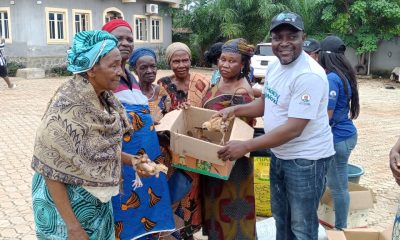NEWS
Over 30% of Pregnant Women in Nigeria Don’t Visit Skilled Health Worker – UNICEF

By Laide Akinboade, Abuja
United Nations Children Education Funds (UNICEF), on Thursday said over 30% of pregnant women in Nigeria do not visit skilled Health workers throughout the nine months of their pregnancy.UNICEF Health Manager, Martin Dohlsten revealed this at a two day media dialogue, he said the normal recommendation is for pregnant women to visit a skilled worker at least 48 visits.
He said, “Latest figures show a maternal mortality rate of 576 per 100,000 live births, the fourth highest on Earth. Each year approximately 262,000 babies die at birth, the world’s second highest national total. Infant mortality currently stands at 69 per 1,000 live births while for under-fives it rises to 128 per 1,000 live births. More than half of the under-five deaths – 64 per cent – result from malaria, pneumonia or diarrhoea.”So if you look at the Nigerian Health Demographic Survey (NDHS) that was done from 1990 up until now, there’s a new one coming out this year, but the data has still been validated. But if we look at the trends from 1990 to 2018 for neonatal mortality rates, it hasn’t really declined.”So there would be, of course, a diversity within Nigeria where you can see, you can, you can see generally, maybe states in the northwest, maybe to some extent, north, the northern belt, have a higher mortality rate than some parts, especially the southwest, where you see more improvement”.He continued, “In rural areas, 38 percent of women made at least 4 antenatal care (ANC) visits compared to 75 percent in urban areas. 23 percent in rural areas, visit skilled workers after birth compared to 67 percent in urban areas. Only 8 percent of newborns in rural areas receive postnatal care (PNC) within 2 days after birth, compared to 25 percent in urban areas.”80 percent of mothers with higher education made at least four ANC visits, compared to only 28 percent of mothers with no education.Only 12 percent of mothers with no education had a skilled attendant at birth, compared to 44 percent with primary education and 93 percent for mothers with higher education.”Five percent of newborns are checked within two days after birth if their mothers have no education, compared to 14 percent of mothers with a primary education and 38 percent of mothers who received higher education”.He noted, “Nationwide 30%of infant mortality was due to delivery problems with 50% of deaths happening in the first week. Neonatal fatality in North West states of Kaduna is 63 deaths per 1,000 live births, four times higher than the south west.”The slow uptake of antenatal care especially among young, poor rural women is the reason babies don’t survive beyond one day. While almost half of all women gave birth in a health facility, only 36% women in rural areas gave birth in a health facility compared to 74% of women in urban areas.”In Nigeria 79% of new born deaths are due to three preventable causes. Infection complications during childbirth mainly asphyxia, prematurely”.He noted that for Nigeria to achieve the SDG 3.2 target by 2030, Nigeria needs to rapidly accelerate under 5 mortality rate reductions from 1.8% per year.If Nigeria is to be back on track to achieve the 3.2 target, over 3,597,700 under-5 deaths could be averted by 2030.NEWS
Nigeria Customs Service Foils Smuggling Attempts, intercepted PMS worth over 95 million in Adamawa.

From Yagana Ali Yola
The Nigeria Customs Service, Zone D, Adamawa State, has made significant seizures of petroleum products and arrested suspects in various smuggling operations.
The seizures include 2,276 jerricans of Premium Motor Spirit (PMS) and 19 jerricans of Automotive Gas Oil (AGO), with a total Duty Paid Value (DPV) of ₦95,695,000.
The controller general of custom Bashir Adewale Adeniyi , who was represented by the commander operations whirlwind
HK Ejibunu said the smuggling operations were intercepted at various notorious smuggling flashpoints, including Malabu-Belel Axis, Girei-Wuro Bokki Axis, Gurin-Fufore Axis, Jamtari Axis, Maiha Axis, Jimeta Waterside, and Mubi-Sahuda Axis.
The petroleum products were carefully concealed and being prepared for illegal export or distribution to neighboring countries.
Earlier in his welcome address the controller Nigeria custom Adamawa/ Taraba command HB Bashir call on good people of Adamawa state to cooperate with the command in other to bring to an end the activity of the Economics saboteurs who snuggled PMS to the neighboring country of Cameron at detriment of Nigerian.
However, the Nigeria Customs Service reported a disturbing incident of a violent mob attack on its operatives while on duty. The officers were ambushed by violent mobs and smugglers who barricaded access roads and assaulted the officers. One of the attackers was fatally injured during the chaos.
The smuggling of PMS not only results in revenue loss for the country but also puts additional pressure on the already strained fuel supply chain. The Nigeria Customs Service is committed to curbing such illicit activities that threaten national security.
The Service is working with relevant security agencies to identify and bring all perpetrators to justice. The public is urged to support law enforcement activities by providing timely intelligence and standing against such wicked acts and criminalities.
The Nigeria Customs Service remains committed to its mission of protecting the nation’s borders and preventing economic sabotage. The Service condemns the violent attack on its operatives and reiterates its zero-tolerance stance toward violence and obstruction of official duty.
| ReplyReply allForwardAdd reaction |
NEWS
Group Empowers Women in 12 Akwanga Communities with Poultry Items.

From Abel Zwanke, Lafia
As part of its ongoing efforts to promote grassroots entrepreneurship and self-reliance, the Community Initiative for Character Moulding and Entrepreneurship Development (CiCMED), under its Future Planter Happy World Project, has empowered women in 12 communities across Akwanga Local Government Area of Nasarawa State with poultry starter kits.
The one-day community engagement, themed “Building Self-sufficiency and a Brighter Future for Nigerian Mothers and Children (Happy World),” was designed to equip rural women with the resources needed to establish and sustain small-scale poultry farming ventures.
Beneficiaries received 240 Nuellas (pullet chicks), poultry drinkers and feeders, and bags of chicken feed to aid their startups.
Speaking during the one Day distribution exercise on Wednesday, the programme coordinator, Mr. Kefas Tigga, said the empowerment was a deliberate effort to build economic resilience among women, particularly in underserved communities.
“This project is a response to the need for sustainable empowerment. We believe that by equipping women with these poultry items, they can generate income, support their families, and contribute meaningfully to local food production,” Tigga stated.
He acknowledged the vital support of Rt. Hon. Musa Ahmed Mohammed, the Nasarawa State Accountant General, who also holds the traditional title of Baraden Nasarawa, for his unwavering commitment to community development.
“We’re grateful to Rt. Hon. Musa Ahmed Mohammed, the Nasarawa State Accountant General, for his continued support for initiatives that promote economic growth and social impact at the grassroots,” he added.
One of the beneficiaries, Mrs. Amina Adamu, expressed her gratitude, describing the project as a life-changing intervention.
“This is the kind of support we need. With these birds and feeds, I can start something immediately. I’m very grateful,” she said.
CiCMED reaffirmed its dedication to closely monitoring the beneficiaries’ progress and pledged to extend the Future Planter Happy World Project to more communities across the state.
NEWS
Hepatitis: FCTA Screens Food Handlers

By Laide Akinboade, Abuja
In order to safeguard public health and food security in the Federal Capital Territory (FCT), the FCT Administration (FCTA) will soon commence a comprehensive hepatitis screening of food handlers, especially those working in restaurants, markets, bakeries, canteens.
The initiative is aimed at preventing hepatitis and other foodborne diseases, thereby protecting public health and empowering food businesses to operate with enhanced confidence and credibility.
This was contained in the FCT Minister, Nyesom Wike’s goodwill message, marking the World Hepatitis Day 2025.
The goodwill message delivered on behalf of the Minister by the Mandate Secretary, Health Services and Environment Secretariat, Dr Adedolapo Fasawe, reads in part, “Hepatitis A and E, primarily transmitted through contaminated food and water, can rapidly spread through poor hygiene practices, posing serious risks in our rapidly expanding and cosmopolitan city of Abuja.
“Furthermore, Hepatitis B and C, predominantly spread through blood and bodily fluids, still pose a risk in food environments where open wounds or poor hygiene are present.”
The FCT Minister described food handlers as an overlooked group whose role is pivotal in safeguarding public health.
“Therefore, the FCT Administration, committed to safeguarding public health and food security, is launching a strategic initiative to enhance food safety through comprehensive hepatitis screening of food handlers. This ambitious initiative is being scaled up through an innovative Public-Private Partnership (PPP) consortium, in alignment with the National Policy on Food Safety and Quality.
“This PPP consortium will combine efficiency, technical expertise, and funding capacity of the private sector with government oversight to implement regular and mandatory Hepatitis B and C screening for all food handlers within the FCT
“We urge all stakeholders, government agencies, private enterprises, healthcare providers, and food industry operators to actively support this transformative initiative through the mandatory hepatitis screenings for food handlers, promotion of free and effective Hepatitis B vaccination at public health facilities, enforcement of standardized food safety training inclusive of hepatitis awareness, rigorous enforcement of licensing, hygiene inspections, and medical screening requirements for food vendors and handlers and raising awareness and compassionately addressing the stigma surrounding hepatitis.
“To us, food handlers are not just service providers, they are essential public health stewards. Simple, consistent, and safe hygiene practices can significantly reduce hepatitis transmission.
“Therefore, let us break the silence. Hygiene cannot wait. Screening cannot wait. Action cannot wait. Together, let’s ensure that the FCT leads by example, turning our food industry into a symbol of health, safety, and excellence.”
| ReplyReply allForwardAdd reaction |



















